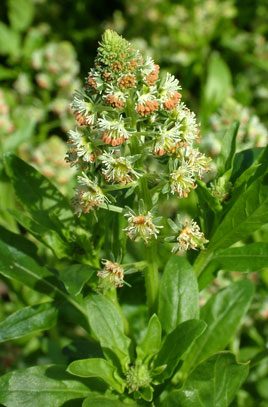| |
Reseda (Reseda Odorata, Mignonette)
 |
Reseda odorata, or Mignonette, is a native of Egypt and the shores of the Mediterranean. It was known to Pliny and the Romans. It is probably native to the Mediterranean Basin, but it can sometimes be found growing in the wild as an introduced species in many parts of the world. In the wild it is a small plant with fragrant greenish-white flowers with red stamens, but several cultured varieties exist. Reseda odorata is a species of flowering plant in the reseda family known by many common names, including garden mignonetteand common mignonette. Bees are fond of mignonette because of its plenty of nectar. Mignonette has been grown in the Grasse region for perfumery purpose (by extraction). In order to achieve highly odoriferous flowers, mignonette requires a rich, fertile, clean soil with plenty of sun and irrigation.
The flowers have an intense, sweet, violet-like and fruity odor with a green nuance.
Interestingly, the vacuum headspace concentrate of mignonette flowers contains remarkable amounts of the theaspirones shown, 4-11 % and 4-6 %, respectively. These compounds are also known as natural constituents of tobacco aroma and are, as well as the ionones, derived from carotenoid precursors.
Etymology: Lat. resedare, relieving. Fr. mignonette, "little darling".
Common names: Mignonette, Egyptian Mignonette, Sweet Reseda, Egyptian Rocket.
References:
In part contributed from:
https://en.wikipedia.org/wiki/Reseda_odorata
Disclaimer: The information presented herein is intended for educational purposes only. These statements have not been evaluated by the FDA and are not intended to diagnose, cure, treat or prevent disease. Individual results may vary, and before using any supplements, it is always advisable to consult with your own health care provider.
|
|


















